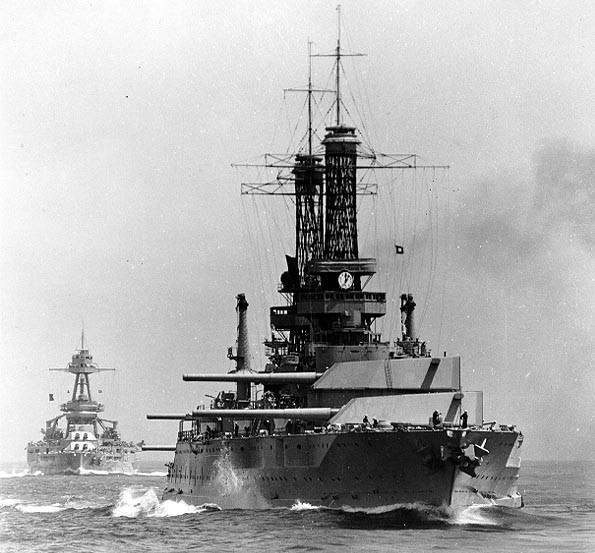Welcome to the first installment of Line Ahead, the first of what will hopefully become a series of editorial musings on the wider scope of naval gaming. For this column’s maiden voyage (see what I did there?), I thought it might be prudent to ask the most basic question about naval gaming: Why play a naval game in the first place?
 Of course this question has a couple of assumptions wrapped up in it, that naval wargames are a distinct subset of wargaming and that they offer a unique way to enjoying the hobby chief among them. I won’t go into too much detail on these assumptions here (they are probably good fodder for additional editorials, and I can’t go wasting all my good ideas at once, now can I?), but I figure that in the interest of full disclosure I at least recognize their existence.
Of course this question has a couple of assumptions wrapped up in it, that naval wargames are a distinct subset of wargaming and that they offer a unique way to enjoying the hobby chief among them. I won’t go into too much detail on these assumptions here (they are probably good fodder for additional editorials, and I can’t go wasting all my good ideas at once, now can I?), but I figure that in the interest of full disclosure I at least recognize their existence.
I suppose that the simplest reason to play a naval game is simply that one enjoys it; this same basic answer could be used for any game, though, so it does seem inadequate to leave things at that. As a naval officer, I of course have a bit of a professional fascination with naval gaming. It has served my profession well in the past, serving as a way to test out tactics and strategies before they are implemented at sea. So, in some small way, I feel like I am carrying on a “family tradition” of sorts.
Then, there is also the jump in scale. The idea of enormous warships sailing majestically through the sea (or the interstellar void, for that mater) is a very potent mental image. Of course, when it comes time for a fight, those incredibly large ships also mount some incredibly large weapons! Looking at history, even the largest gun that was typically used in land warfare was at best a medium-sized gun in naval terms. Seems only natural since ships are the largest moving objects ever built by man. On a related note, warships have often represented some of the most advanced technology developed to that date. Even in the Space Age, modern naval vessels continue to be high-tech pieces of hardware, with complex weapon, sensor, and propulsion systems. Representing all of this high technology on the gaming table is an irresistible attraction for a technology nut like me!
There is also a practical side to the matter; naval games are often easier to get into compared to many land-based games from both a skill and a cost standpoint. Naval miniatures commonly require very little assembly, and painting a squadron of ships is often a lot less intimidating and time-consuming than painting a squad of troops. This makes naval games great for beginners, or those that lack the time or skill for intricate painting (although, granted, other technological constructs like tanks and Space Marines are also not so hard for a beginning painter!). Some games, like War at Sea, even come pre-painted, removing the “hobby” aspect all together if so desired. Cost wise, naval games tend to require fewer miniatures than most land-based games. Not to mention that many space combat rule sets don’t particularly require a specific set of miniatures be used. All this mean is that a gamer doesn’t have to spend as much to start or keep up with a given game (not that I’ve let that stop me!).
In the final analysis, I think that the main reason I play naval games is the first one I listed: I enjoy them. Everything else is probably just window dressing to help convince the wife that, yes, I do in fact need that 4th fleet for Dystopian Wars. Until next time, Good Luck, and Good Hunting!

I got into war gaming initially because of my interest in naval gaming. — in 1969 a saw an ad in Boys Life for an outfit called Alnavco which sold (and still sells) 1:1200 scale warships.
My military career ended up being in the Army, but I never lost my interest in naval gaming.
I do think it’s fair to consider naval wargaming as a hobby unto itself, although obviously there is a lot of overlap. Still, naval wargames date back to Fred Janes’s naval war game of the late Nineteenth Century and there was active use of naval wargames for professional purposes at places such as the Naval War College in Newport, RI. During the interwar years the author Fletcher Pratt popularized naval wargames for entertainment. All this war in advance of the state of the art in land-based war games. HG Wells famous Little Wars is much more abstract and game-like than Janes’s Naval War Game from the same era.
Very interesting! I’ve not delved very deeply into the history of naval gaming itself; most of what I’ve read has come in the way of references made in operational histories.
Very well put. I’ve loved warships since taking tours of everything from patrol boats to carriers while waiting for my dad to finish his USNR weekends in the mid sixties. Now I’ve gamed every era from the age of galleys to BFG. I’m really looking forward to reading the articles.